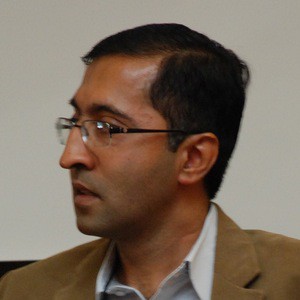Martin Nisenholtz: I’m here in Manhattan with Jonah Peretti on March 7th, 2013. Jonah is founder and CEO of BuzzFeed. First question, 5 to 10 minutes. Just background. How you discovered digital journalism.
Jonah Peretti: I’ve been interested for years in how people share content, ideas. What do people talk about? Why do they talk about those things? Why are there some things that seem awesome that don’t go anywhere and other things that seem silly or trivial that get spread to millions of people? I accidentally fell into this when I was a grad student at the MIT Media Lab. Nike had launched this service where you could customize your shoes with a word or phrase. Being a smartass, I tried to customize my shoes with the word, “Sweatshop.” Nike wrote back saying it was inappropriate slang and they wouldn’t put it on the shoes.
I said, “No, it means a shop where factory workers toil under unhealthy conditions. It’s been in the dictionary for two years.”
And then we had this back and forth. At the end, they just said, “Well, look. We reserve the right to not do the shoes.”
I said, “OK, that’s fine. I’ll change the ID on the shoes but can you at least send me a picture of the 12 year old Vietnamese girl that stitches them together?” Then they didn’t write back after that.
That was a few emails back and forth. I sent it to a few friends. Those friends sent it to their friends. If you remember back in those days, this was…
Martin: What year?
Jonah: This was in…Now I’m forgetting the year.
Martin: Roughly.
Jonah: I’m extremely bad with chronology. I think it was in 2001. I think it was January of 2001. If you remember back to January in 2001, there were these things called email forwards. Even though email forwards was a completely broken architecture for sharing, people would send things to their whole address book. Sometimes their friend would get it 27 times. Their friend who got it 27 times would often get frustrated that they’re getting an email so many times.
Today, you’ll get the content in your Facebook news feed and it will say, “27 of your friends have shared it,” but you’ll only see it once. Things have improved since then, but even then, when the mechanism for sharing was broken, people wanted to share.
This email got shared to millions of people. I ended up on the Today Show with Katie Couric and a Nike executive debating sweatshop labor, which I knew nothing about, because this email had been shared so widely.
Martin: And you were at MIT at the time?
Jonah: I was a grad student at MIT.
Martin: Grad student at MIT. Were you at the Media Lab?
Jonah: I was at the Media Lab.
Martin: What were you studying at the time? Did you suddenly go into this or were you interested in this at the time?
Jonah: I was studying educational technology. I had previously been a school teacher in New Orleans. I went to MIT to think about how technology could influence and improve learning. Then this email happened and it made me incredibly fascinated with networks. So I started walking around MIT’s campus, finding people who were experts on networks. My good friend, who also got obsessed with this, was a guy named Cameron Marlow, who now is the head of science team at Facebook. He built something called Blogdex, which was actually very influential and important, back in those days. It looked at all the links that were being shared on blogs and showed you the most rapidly accelerating links that blogs were sharing.
I became good friends with Duncan Watts, who is a mathematical sociologist, who figured out the mathematics of six degrees of separation and small worlds, and then various MIT folks as well. And started to just try to understand, how does this stuff work? How is it that, without a printing press or a broadcast pipe, by sharing something with a few friends, I can reach millions of people?
Cameron actually said, “These things are anomalies. You couldn’t do it again.” So after that I was like, “OK.” I wanted to try to prove that I could do it again. After that I made this thing called The New York City Rejection Line. Which was a phone number where, if people wouldn’t take no for an answer and they were hitting on you, you could give them a local number.
When they called it, it would be an automated rejection message. It had a similar effect. It spread virally and reached tons of people. After that, I did something called Black People Love Us, which was a website that looked like it was a personal website of two super white people named Sally and Johnny who were so proud of having black friends that they made a whole website, with testimonials from their black friends.
Both the Rejection Line and Black People Love Us, I did with my sister, Chelsea Peretti, who’s a standup comic. She went on to write for Sarah Silverman and “Parks and Recreation” and does standup.
But at the time, nobody was trying to make things go viral on the web. YouTube didn’t exist. Facebook, Twitter didn’t exist. It felt, to me, like there was something new and different, which is that, if you made something really interesting and fun, whether it was humorous, provocative or political, it wasn’t clear what it had to be. But there were these things that a person could make in a weekend that would end up spreading to millions of people. That, to me, seemed very interesting.
So, I started doing work with political campaigns. I started doing work with non profits. I started doing some consulting with companies all around trying to understand how this stuff works, and why things get shared, and how they get shared.
Martin: Email was basically the technology of the day.
Jonah: The Nike email forward was an email. That was spread through email. The Rejection Line was a phone number. We actually got voice boxes and we ended up filling a T1 voice line continually from early in the morning to late at night of people calling and hearing the Rejection Line. Black People Love Us was a website and that was a little bit later. That was in 2003, and that started getting shared on blogs and message boards. “The New York Times” wrote a nice profile in Sunday Styles on it. In each successive project, the time for it to spread got shorter.
The Nike email was six months before it started to die off. Rejection Line was three, and Black People Love Us was one month. The networks and the ability to share kept getting more and more tightly connected so that media would spread faster. You’d reach more people more quickly, but it would die off more quickly.
That was the kind of work I was doing at this non profit in New York called Eyebeam where I was the Director of R&D. There were a lot of artists who worked in my lab. That was sort of my personal work, but I also ran this lab of artists who were doing all kinds of different work. Some were doing robot…
Martin: You left MIT in taking this job in [inaudible].
Jonah: Yes. A lot of people don’t know the story of Eyebeam. Josh Schachter would come. When he used to work at Morgan Stanley, he’d come and work on Delicious at night from Eyebeam. Jeff Hahn, who did the technology that made those election screens that you see on CNN where you can zoom things around, was working on projects at Eyebeam at night. I was doing these contagious media things.
There was a group there called the Graffiti Research Lab that was building all kinds of technology for graffiti. They’ve been covered by The Times and some other publications widely as well.
So, we were sort of activists, artists, hackers. We released everything under open source. We did a project called reBlog that was an RSS reader that let you click a button to reblog things you wanted onto your site, so you could curate a site. That ended up inspiring Tumblr and other services to have this simple thing.
It was all totally non-commercial, totally…Because it felt like there was these interesting things you could build on the Web at that time.
We had the support of John Johnson, who was the founder of Eyebeam, which allowed us to have this space where we didn’t have to worry about generating any revenue. We could just worry about doing things that we thought were worthwhile.
Martin: Ken Lerer finds you there or…?
Jonah: Ken Lerer calls together a summit to help with his gun control cause. He has John Borthwick invite leaders in the Internet field, the smartest people in New York, who know about technology, who could help with his cause. I was, actually, not one of those smartest people. I was friends with Duncan. Then, Duncan called me and said, “Oh, some rich guy is doing this thing. I’m an academic, I can’t really help him. Why don’t you come along? He really should be talking to you.”
I said, “Well, I don’t know.” Duncan had broken his leg skiing, and he said, “Well, the guy gave me his car, his driver for the evening, so afterwards we can take the car wherever we want.” I was like, “Oh, OK. Let’s go.”
We go to this thing, and I’m kind of crashing it. Everyone is pitching different ideas to Kenny about this gun issue. Scott Heiferman was there, Jeff Jarvis is there, both with various other people.
Scott’s like, “You could create meetups for this cause.” Jarvis is like, “You could do blogs.” Everyone’s talking about their stuff.
I just talked a little about the viral things I’d done. Kenny was in a mode where he wanted to work with lots of people, so he was like, “Hey, why don’t we try to make something viral about this gun stuff? Why don’t we work together on that?”
He ended up coming to Eyebeam and seeing these research labs that we had, that would brainstorm ideas. Separate from that, Kenny and I ended up working on this Stop the NRA Campaign, the NRA Blacklist, where there was a list of people that…
Martin: It didn’t work.
Jonah: It worked short-term, not long-term. It resulted in a legislative victory and then the legislative victory was later eroded. But it got a lot of people to sign up for a list. It put pressure on Congress and it resulted in a short-term win. Kenny is still working on the longer term battle. But that’s how we worked together. I had never been interested in business, hadn’t done anything in business, had also never done anything in journalism. I had friends who were reporters and always like them, because they were curious.
Martin: You were a teacher?
Jonah: And I was a teacher. Yeah. I was a teacher, and then a technologist, and then a maker of sharable things on the Internet. I had friends, who were reporters, who it seemed like a noble profession and they were curious, thoughtful people who you would have good dinner party conversation with. So I was favorably inclined towards journalists. Doing Rejection Line and Black People Love Us and the Nike email I talked to tons of reporters about those projects. But always reporters who were the most web savvy reporters, who would get…their friend would email them this story, would email them the project. They would see it and get the idea independently, “I should write about this.”
Martin: So now you worked with him on the NRA thing and he’s now partnered up with Arianna [Huffington]. Do you contact him? Does he contact you? How did that…
Jonah: We were working together on some things. Then he was like, “Let’s do a company together.” I was like, “I don’t know.” He’s like, “I know business. You know the Internet. We should do something.” We basically agreed to do something but we weren’t sure what it was going to be. We were talking about what it might be. Then at some point, he went and met with Arianna. Then he started saying things like, “So, our company with Arianna.” I was like, “What?”
[laughter]
Jonah: He knew I was from a very different world with very different interests, and wasn’t a creature of the media world. He knew that he needed someone who understood the web and technology. I ended up flying out and meeting Arianna. I remember we had a 7 AM meeting which, for me, is incredibly early. She was already in a meeting with another group when I woke up, came out of my room in her house and she’s already at the table having a full breakfast with like some NGO in LA that was working on an environmental cause or something. I was like, “What?” I don’t know if I was the second breakfast. Maybe it was the third or fourth. But she was definitely starting earlier. Next thing I knew, Lori David was there and we were flying to Phil Angelini’s rally in Sacramento, which wasn’t planned.
I came back feeling like, if anything, it would be an adventure. Arianna was incredibly charming and tireless and driven. Then we formed a partnership, also with Andrew Breitbart, who used to work for Arianna. The four of us went into business together. We started hiring a founding team. Then, of course, Roy, who was working with Arianna previously and continued, became a partner at HuffPost too.
Martin: We’ll drill much more deeply into HuffPost in a minute. I just want to finish the bio. So HuffPost is sold to AOL. Do you go to AOL then?
Jonah: No, I didn’t. I started BuzzFeed as more of a lab, to try to understand various things I was thinking about, as HuffPost was scaling and on its path and growing, and went from being full-time at Huffington Post to being one day a week at BuzzFeed, and then went to half time BuzzFeed, half time HuffPost. When we sold, I was about one day a week at Huffington Post. So I would go to the operations meetings, which was all the senior managers. I would spend a lot of time emailing and IMing and talking with Paul Barry about product and tech, and spent a fair amount of time talking with Kenny about various things. But I wasn’t day to day when we sold. So I considered continuing to advise the HuffPost-AOL entity post-sale.
But it seemed like a natural breaking point and I wasn’t doing justice to BuzzFeed by also thinking about the issues that were important to HuffPost. There was a lot of overlap, but I realized that it was a lot less overlap than I thought. And that what you think about in the shower and in your down time is one of the most important things, in terms of providing value to a company.
It was hard to do that, being involved with two companies. Your subconscious was having to fight over what it thought about.
Martin: It’s interesting, because we’ve spoken with a few folks now…Yahoo News was a breakthrough in the mid-nineties. Because it was really the first technology-based news service to take a wire service — it took Reuters — and blast it out there, in a more or less very current and real time way. It quickly became the largest news service on the web. But Huffington Post, I think, was the first news service that really got to scale without much of any original content that was created for another form. Is that correct?
Jonah: Yeah. I don’t know if anyone else has done it. But we definitely did it. [laughs] I’m trying to think.
Martin: I don’t think anybody else did do it. Let’s assume that they didn’t, which means that you guys had to have some kind of insight that allowed you to create something quite large. Was it the share? Does it all go back to sharing? Is that the basis for…Or is there a formula that you think is…
Jonah: I ended up taking a side journey into search. One of the things that was disappointing to me was that there wasn’t really a way to build a big site on social, when we started Huffington Post. You could get some, but we were pretty…It was word of mouth. There was some sharing. Blogs sent a shockingly little amount of traffic. They were talked about so much. But having all the blogs link to us and talk to us got us to be like a one or two million unique visitor site. It wasn’t enough to build a really big publishing entity. The traffic was still largely in search. So we figured out some new things with search.
Also, Google changed it. It used to be…If you think of a classic SEO consultant would go to news organizations and say you should create topics pages.
You should have every major topic and then you should keep linking to those topic pages and trying to win and get in the top ten search results.
Martin: We invented that, right?
Jonah: Yeah. You may have invented it. That made a lot of sense for Google during that era, because Google wasn’t that fast. Google couldn’t catch up, especially when it was purely based on PageRank and inbound links. It couldn’t quickly know, “This is a breaking story that everyone’s searching for.” So Google actually was broken for things like Michael Jackson dying. Or whoever died five years before Michael Jackson. It couldn’t quickly index it. So the topics pages made sense. It was like, you searched for the general topic and you land on The New York Times topic page. It has all the articles there. The new ones are at the top. What we discovered was that, when there was some person, place or thing, some noun, that wasn’t notable and all of a sudden became notable…
That Google was, for the first time, able to quickly react and index that. So like a beauty queen loses her crown. Nobody cares who Miss Wisconsin. But if Miss Wisconsin loses her crown in some sex scandal or something, lots of people search for her name, which was an unknown name the day before and now is a name that’s on every television show and that…if you swarm that, you can be the top search result for that.
That was something that was new, because of changes in Google, and that nobody really understood and no one was really focused… So there was a period of a couple years where we were able to swarm big stories, in a way that worked really well for the Google ecosystem.
Martin: Were you writing stories for the Google ecosystem. There’s a difference — it may seem like a nuance at the outset, but it’ll relate more to BuzzFeed as we go forward — between this notion of taking what you call a big or important story and sending a fire hose of traffic to it by optimizing it, versus tuning the news creation to this particular distribution channel.
Jonah: No, I get what you’re saying.
Martin: I’m not making a judgment. I’m really not. I’m just saying, this has become a theme in some of this history, which we’ll get to in a little bit.
Jonah: Search lends itself to looking for where there’s demand and filling the demand. The most extreme case is a company called Demand Media. The reason they’re called Demand Media is because they noticed that there was lots of demand for certain things. Sometimes long tail demand, like people searched for, “Lemon poppy seed pancakes.” Because they’ve had them once and they want to make them. And there’s no search result for it. This was what About.com did before Demand.
Martin: That’s why I didn’t include About. I don’t view About as a journalistic institution and I don’t view Demand as a journalistic institution. That’s why I didn’t even include…About did get to scale with native content. But I didn’t include them when I talked about your doing it first, because it’s not journalism.
Jonah: Right. I don’t spend very much time thinking about what’s journalism and what’s not journalism. Not that I think it’s bad that there’s people who do that. But when you think about something like Heath Ledger dying, Huffington Post would have five people writing a story and seeing what everyone else is writing and seeing every single breaking news. So aggregating from other sources, linking to other sources. A few sentences of original, a link to, “The Washington Post is saying this. The New York Times is saying this. This was just discovered by TMZ.” This was discovered by tagging it and continually updating it. Google would look at that page and say, “It’s linking to all these authoritative sources and it’s constantly changing and getting updated. So it must be a good source for consumers since it’s constantly getting new information.”
It’s also tagged with Keith Ledger, because people who aren’t that familiar with the actor thought his name was Keith Ledger and were searching for Keith Ledger. So we were number one for people searching for, “Keith Ledger,” which is useful, for people who are searching for the wrong thing. It gives them the right thing. We didn’t say his name was Keith Ledger in the article. But we brought people there through search. From a user perspective, landing on that page actually was a good experience. You do a Google search.
You’re like, “Keith Ledger died.” You search, “Keith Ledger died.” You land on a page and its a page that shows you everything people are saying all over the place, that has commentary and a voice and a perspective and it continually updating. Eventually — I don’t know if we had it at that time — Twitter modules and Facebook modules and content coming in from other sources, comments running on the site.
So, all of that made a page that Google liked and that consumers liked as this one stop shop to find out all the things that are happening all around. Now, the question that some people ask is, “If you are a news organization and you have five people on the scene and you’re doing tons of original reporting and you’re writing these stories and collecting things and it costs much more and HuffPost is getting more traffic than you, is that fair?”
One example of this, I remember some reporter calling me to ask about this a while ago. It was, The New Yorker did a long scientology story and the HuffPost outranked The New Yorker story in Google. The reporter was like, “Isn’t this unfair? Think how much The New Yorker spent on that.” But when you think of what a consumer wants.
A consumer is in their office. They have a little bit of time between meetings. They heard some buzz about a scientology piece in The New Yorker, they search for it. They get a page that has some bullet points that explains what’s in it, a link to it. Like, “You might want to read it.” And three or five percent of people are like, “Oh, I actually do want to read this long piece.” And other people are like, “Oh, I’m glad I know what it’s about. I don’t really want to read this. But I’m glad I know what it’s about.”
From a purely algorithmic perspective or purely technical perspective, Google is giving people, in that case, a good consumer experience. But from an economics of journalism perspective, there is a problem, which is that The New Yorker is spending a huge amount of money to produce this long story and they’re not getting as much traffic online as Huffington Post, which might have spent two hours on it, or some even shorter amount of time. The time it took for the editor to read it and pull out relevant things.
So one question is, what’s good for consumers? Then there’s this other question of what’s good for journalism and how do you build sustainable models for journalism?
Martin: I think that’s a great place to go next. There are people — I’m not one of them — who would say there was this original sin, in 1995, when The New Yorker, or The New York Times, or whomever you want to talk about, decided, A, that journalism should be free, but even more important, in this case, that fair use and copyright law was OK the way it was, it carried over into a new world, an electronic world just fine. And that links should be fairly shared. I’ll just use him as an example, again, not making any kind of value judgment here. But Rupert Murdoch basically is saying, “Absurd for content to be free, absurd for links to be freely available through the social web, because that’s also our content. Copyright is fundamentally broken.”
What do you think of that dynamic, given where journalism is today, in its more traditional incarnation?
Jonah: Part of the problem is that people get so rooted in the way something worked in the past, that then all of their thinking about how things should be in the future is to justify the economics of an older business model. It’s a historical accident that classifieds were so profitable for newspapers. It may be a historical accident that newspapers had monopolies and could do low quality advertising that wasn’t very visible, that still brought in gobs and gobs of money. So just because that’s how it was 20 years ago doesn’t mean that’s how it should be and doesn’t mean that online distribution should have the same economics and should follow all the same rules. Just trying to get the web to mimic what print business provided probably isn’t the best way of using the web.
When you look at what technology companies have built, the technology industry is many times larger than the media industry. From a purely economic perspective, like selling iPads and iPods and computers is a lot better business than selling music even when music was in its heyday. So it depends what you care about. If you care about the economy, you need to zoom out a little bit and look at the bigger picture.
If you care about journalism, you need to think, “What does the web give you that you didn’t have. Why does someone who lives in Philadelphia have to read the local Philly paper and not everything great being produced all around the country? Why do I have to read a third rate write-up of what Facebook’s IPO means because I happen to live in one city and I don’t live in a city where they have a good tech writer?
I’m forced to read that. Is that better for journalism than the very best people in the world are well read because there’s a global network where people can share information and pass things around? So I think that there’s a tendency to focus nostalgically on the things that are lost, and not enough focus on, what are these new opportunities? And how do those new opportunities give us more of some of the things we really love about journalism.
Martin: As Jeff Bezos says, “The web giveth, the web taketh.”
Jonah: Yeah, it’s true.
Martin: It is true.
Jonah: [laughs]
Martin: [inaudible 0:30:11] close, I think of all time. [laughter]
Martin: Look, obviously you know I’m playing devil’s advocate here, but I do want to go back to this New Yorker example because it’s really a good example. The reality is that a lot of journalistic institutions are in deep trouble. It’s very hard for me to see the substantive, high-quality thing that replaces them. I’ll give you an example. You mentioned Philadelphia. I’m from Philadelphia, I hate to admit, but I am. “The Inquirer” used to be a very, very good paper, actually. It may still be. I don’t want to bias this in any way. All I’m saying is that they’ve been sold, like 3 or 4 times in the last 10 years. The last time, for pennies on what they were sold for on the dollar before. Tribune company is in bankruptcy.
So, Jonah, nobody seems to be able to come up with a model for local journalism so that all of these corrupt state houses have a watchdog in their community.
I think your point about the “New Yorker” article…Well, I think “The New Yorker” is going to be just fine. It’s part of Condé Nast, and it’s a national publication, and it has a global reach. There are other forums that are not going to be just fine — it’s part of Condé Nast, it’s a national publication and it has a global reach — there are other forms that are not going to be fine.
Jonah: By the way, BuzzFeed just published a 6,000 word piece on scientology.
Martin: You took some shit for that, too. Didn’t you?
Jonah: No, I think you’re thinking of something else.
Martin: Oh, I am. Yeah.
Jonah: [laughs] We take shit for things. But we didn’t take shit for that one. [laughs] But it was a piece of former scientologists talking about what some of them were calling a real estate scam that scientology was running. So it is possible to fund that kind of work online. We did it. But to me, I agree. It was a very interesting philosophical question.
Should Google…Or now, Facebook is even more relevant.
Martin: Twitter is the most relevant.
Jonah: Or Twitter. Should they be organized for the good of the consumer and what the consumer likes, or should they be organized for the good of the business models of existing media companies? Or should they be organized according to some higher principle of journalism or what people should receive? Those are three very different things. You would organize what you feature very differently.
Martin: But this is a history. John Huey characterized it this way. He said, “Look, it’s a timeline. Below the timeline, there’s this incredible tide — all the events, the technologies, the things that happened, the invention of the Huffington Post, etc. Above the timeline are these swimmers. There are people who are making decisions and trying to find their way.” One theory that a lot of people have thrown out is that the tide is just so powerful that the swimmers are inevitably going to drown — at least some of the swimmers from the old world.
Another theory is that, the decisions that I talked about before, the historical decisions, the decision to give content away for free, give links away. The link economy, as Jeff characterizes it.
Not go hard at copyright. These were decisions that were made, in the mid to late nineties, early 2000s. I made some of them. Things would be a lot different if they had been made in a different way. That’s really what I’m trying to explore with you here.
Jonah: In the old school newspaper wars, in the William Randolph Hearst era — I’m not so well versed in this history, but have read a little bit about it — it sounded more similar to what’s happening now than what happened 10 or 20 years ago. The way the industry was. People would rewrite each other’s stories. It wasn’t linking or aggregating. But you send someone to cover the Spanish-American War and then it’s in another paper and you’re like, “I spent all this money to get this scoop and then someone has a morning edition and can quickly rush out there version of the story.” And they write it with more voice. It’s not like you can copyright reality. You’re reporting on the news.
If you have any self-respect about what you’re doing as a profession, you want the public to know about what’s happening in the world and to be more well-informed and to know what’s happening. It’s not like you’ve created a movie and you want to maximize your revenue from the movie through every release window and control the content as much as possible.
Once someone knows that a plane has landed on the Hudson, there is no way to tell people, “Hey, no one else is allowed to report that a plane has landed on the Hudson. That is our intellectual property.” I don’t think it’s that someone made some mistake early on. It could have been even worse. It didn’t work out so well for the music industry, to sue their own customers.
It could have been worst if the newspaper industry had decided that any time someone tried to rewrite their story, they were going to sue them. It’s not clear to me that it was about bad decisions. I think the Internet is a massive technology that has changed so many things. It has a certain logic to it. Networks have a different logic, that is counterintuitive to people. The way networks function is still counterintuitive to people.
Now that’s a primary way that media spreads, it’s through networks. Increasingly through social networks, where people are the ones making the decisions about whether to share stuff. That would have been true, even if every piece of premium content was behind a pay wall.
It just would have led to more content being created outside of those pay walls, and more rewriting of content hidden behind those pay walls — which is something that’s pretty impossible to prevent.
Martin: Skipping forward now. Your point about scientology is a really interesting one. We just had the Goldsmith Awards, at Harvard. You basically sit and listen to these six or seven teams of reporters who’ve gone out and done really important, socially-moving, things. One was a tribute series on fire retardants and the corruption in the chemical industry. Putting that aside, it sounds to me like what you’re saying is, a new formula is emerging. A new business model or set of economics are emerging. It might not be the Tribune Company doing those things in the future. It could be BuzzFeed. It could be the Tribune Company. I’m not suggesting it wouldn’t be. I’m just saying that you believe that it is possible to create an economic value around which socially important journalism is created.
That takes significant investment. Not just rewriting somebody else’s work. But putting a team out there for six months?
Jonah: Yeah. For sure.
Martin: Could you talk about that? What is that? Is it The Huffington Post? Is it BuzzFeed? Is it both? Is it other things?
Jonah: I try not to talk about Huffington Post, because I’m not there anymore and I don’t know the latest of what’s going on there.
Martin: Sure. That’s fair.
Jonah: One of our goals at BuzzFeed is to build a real, sustainable business that generates profits, to build a media company for the social age. There are all these big media companies that, 10 years ago, Time Inc., The New York Times, all these companies were worth $10 billion and were seen as really great businesses. But you haven’t really seen that with digital yet. You’ve seen people build companies that, by old media standards, are fairly modest. I think that’s because we’re at the beginning of a transitional period and that eventually it should be possible to build much larger, more successful, more profitable companies in the digital space.
But you have to be native to digital. You have to have a business model that works for the web and for social. So that is one goal. The reason I start with that is because I think there’s some kind of a Zen paradox. Where if you start with journalistic goals, where you say, “My goal is to have great journalism like we used to have,” or, “My goal is to have great journalism like the kind that’s really expensive or whatever,” that it works against the long-term goal of having good journalism, because you end up starting with this assumption that you need a rich billionaire, a non-profit or a public service philanthropic organization to fund it. And people aren’t trying to pull their own weight. You end up, at the end of the day, with less resources to invest in journalism.
BuzzFeed started where the social web was, which was fun, sharable content. Internet memes and humor and cute animals. We built an audience. We built a business and we built a new model for advertising. And that is what allowed us to hire Ben Smith. That is what allowed Ben Smith to hire all these talented reporters that he’s brought on to the point that we were able to have the budget to have people travel with the Romney campaign, have Michael Hastings covering Obama.
We were able to do a lot more by building a business that was more than just a narrow vehicle for, “We want to do a certain kind of journalism and reporting.”
Martin: So it was kind of a reverse mullet strategy?
Jonah: [laughs] Yeah. I feel like I’ve replaced the mullet with the Paris café, which is the idea the nobody wants to go read philosophy by themselves in the library. You want to bring your Sartre to the cafe and you want to have your copy of Le Monde. When you turn to pet the cute animal, it doesn’t make you stupid. When you flirt with someone at the next table or gossip about something trivial, it doesn’t make you dumb. People are interested in lots of different things. You can be smart, but also have a heart. You can have a heart, but also be interested in something trivial. All of those things can co-exist. So that’s where we started, at BuzzFeed. But we realized, looking at our audience…The majority of our audience is 18 to 34, according to ComScore.
We never really tried to go after that demographic. But those are the people who are most active on social. Those are the people who are sharing. Those are the people who, for whatever reason, flock to our site. They tend to be very educated. They tend to have high incomes. They tend to live in big cities and be the kind of people that omnivorous about culture and all these different things.
That’s before Ben Smith arrived. Those are the type of people reading. Those are people who are interested in politics and in business and in sports and in news, and all these other things. They weren’t getting it from BuzzFeed. But that audience is hungry for those things. For our audience, it was natural to add those things, to add that and make the site better and grow out ambitions and grow the mix of content.
Martin: Talk a little bit about the business model, at this point. Because I think everything you said is really laudable. The thing that I’m a little bit suspicious of, only because it’s been 32 years of this up and down stuff is that advertising a solid enough revenue stream to do what you’ve just described. Tell me why you think that’s the case.
Jonah: I don’t think banner ads are a solid enough basis for it. And just like this shift has happened on the editorial side, towards social distribution of content, the same shift is happening a little bit later, on advertising. Where the leverage you get from massive networks can mean the same piece of creative and the same size media buy can get you much more distribution. It also, from my perspective as someone who didn’t grow up in newspapers…The church, state separation is very important. And Ben Smith is very rigorous about it. I agree wholeheartedly that church and state is really important.
The thing I don’t like about the church, state division, as someone who sits above the divide, is that it can lead to a two tiered system where the journalists are seen as the whole purpose and greatness of everything, and that the people in advertising are seen as a necessary evil that are doing things that, “Well, you kind of have to do, but it kind of sucks. In an ideal world, there would be no advertising.”
To me, that just seemed a deeply flawed way of thinking. If you think that way, how do the people who work on ad side do good work? You’re like, “You’re a necessary evil and you’re just here to support these journalists.”
There’s no way for them to do good work and there’s now way for them to innovate and get the resources they need and to be taken seriously. So we have said, “We have church, state. But we want to avoid conflict between them and set up a situation where both of them can go for it and try to do really great, innovative stuff.”
So we’ve developed advertising technology that now is starting to power other sites. Other people are using our technology. We are an advertising solution, not just for BuzzFeed, but for Twitter, for Facebook, for the social web. People are launching content on BuzzFeed and using our social discovery team to push that out to Facebook and Twitter and other platforms.
So, the scale is really infinite. The expertise we have, in terms of data and technology about how to make advertising work in a social era is something that gets us into this much bigger market that’s beyond just monetizing our site. It’s a new approach to advertising and marketing.
Martin: It reminds a little…I don’t want to be hyperbolic here and I don’t mean to be at all. But just in terms of … it reminds me a little of Google, writ smaller. In other words, Google essentially had a search engine and discovered a kind of native ad format on that search engine and took it out to the world.
Jonah: Yeah. The reason that Google AdSense has maintained margins, has been a good business, is because they’ve had the search engine to bolster it. If we can have a giant, owned and operated hub for social content that also is an ideal place to launch social advertising, then we can extend that out to other sites. That makes what we’re doing on other sites more powerful, because we have more data. We have more knowledge. We have a better platform. We have better technology. We can innovate on our own platform and see how to make things work better and then extend that out. So, learning from tech companies is something that media companies need to do more of. Google, obviously, is a very aspirational thing to look at. But some of the stuff that Google has done and Apple has done has been very inspirational to us, in terms of how we run the company and some of the way we organize the company — with every employee having stock options and with lunch for the whole company in our cantina, drinks and snacks — and some of the things that you associate more with startup companies, have had a great effect on what we’re able to do, even though we’re, in many ways, a media company.
Martin: That’s interesting. I lost my whole train of thought now.
Jonah: That’s my goal, to make you lose your train of thought — and anyone who’s watching this.
Martin: You talked about Google and Apple as models. Do you look at others as models. Is anyone in media, in your mind…They can be small companies, too. Is anyone doing it right at this point?
Jonah: I love The New York Times. They have a great site. They have consistently had a great site for many years. The content of The New York Times is great. I read The New York Times every day. The reporting is great. We’ve learned a lot from partnerships we’ve done with The Times on how to think about this growing journalistic enterprise that we have at BuzzFeed. There are a lot of other sites that…I love the MemeARandom sites, which is not really the kind of company you’re talking about. But for someone in the industry, as a trade publication 2.0, reading MemeARandom and TechMeme and what’s the other one? I’m forgetting the name now. MediaGazer. I find really useful. I’m trying to think what other sites I read.
Part of it is that things are getting a little less site based. It’s more like your Twitter feed and your Facebook feed is what you look at. But then you’re like, “Oh, that’s a really smart piece by The New Yorker. That’s a really smart piece by the Times.” The brand still matters. You’re discovering it not my directly navigating but in your stream.
Martin: How important is Twitter to you, at this point, as a distribution channel? Is it feeding you half your traffic? One percent?
Jonah: In raw numbers, it’s not that significant. In terms of influence and importance, though, it punches above its weight, as our president says to every small world leader.
Martin: So is the main man Facebook?
Jonah: Facebook sends much more. Pinterest sends more to us then Twitter. StumbleUpon sends a fair amount. Reddit, very spiky, but sends a fair amount. Email and some of the dark social stuff sends a lot.
Martin: It sounds to me like you have, in this Zen way, totally embraced what the Internet is, in order to build something important. Is that characterizing it correctly or not?
Jonah: I think so. But it wasn’t like I let go of embracing something else. It was easier to embrace the Internet, because I never had another girlfriend. [laughs]
Martin: You can’t conceive, for example, of charging for BuzzFeed? That would be just antithetical to the whole social philosophy of it, right? You’re married to advertising?
Jonah: Yeah. I do think that there’s lots of interesting new business models emerging and it’s hard to know which ones are going to be important.
Martin: Do any of them make any sense?
Jonah: Like Ben Lerer, who I’m friends with, at Thrill List. Combining media and commerce has worked phenomenally well for him. Could BuzzFeed do that in the future? I don’t know — maybe. Social plus media, Mobile plus media, Commerce plus media, there’s all these media plus something that seems to be producing things that are more than the sum of their parts, so some of those could lead to whole areas beyond advertising, or just new kinds of advertising that could be sustainable and promising and build a big market.
Martin: So I guess you think that we’re at the beginning of something? This is not mature, it’s almost experimental, still, the whole idea of journalism and digital journalism?
Jonah: I think that you had an era where portals were dominant, an era where search was dominant. Now we’re at the beginning of an era where social is dominant. So digital feels old and has been around for a while. But social, to me, seems like it has more potential both to create new, interesting kinds of monetization and also to be a friend of original reporting in journalism. Googlebot is dumb and will aggregate the page that has the most keywords, that seems the most relevant to…but it doesn’t know that that’s not the original piece, or the authoritative piece.
Whereas on Twitter, nobody is going to retweet that piece, no-one is going to share that piece. Even the Heath Ledger piece I was mentioning, it’s useful to the consumer who does a search and lands on the page, but it’s not the most shareable piece of content.
It’s big, and it’s messy, and there’s lots of information, and you don’t really respond to it in an emotional way, the same way you do something that is cleaner and tells more of a story.
People will retweet the Ben Smith scoop or the Hastings scoop. They’re not going to retweet the rewrite of it. I think that actually makes the reporters that we’ve hired…They pull their own weight in terms of traffic because of the social web.
Martin: How much of your traffic do you buy?
Jonah: We don’t buy traffic.
Martin: You don’t buy any traffic.
Jonah: The only traffic we ever buy is R&D for branded content distribution. We have a social discovery team that can buy on Facebook and Twitter and all these other platforms. We will often use our own content when we’re testing a new approach or a new idea, not so much to drive traffic but to measure how stuff is working.
Martin: Interesting. You don’t see any future in arbitrage in social in that way.
Jonah: There might be. There’s probably more of a future in if you had a paid app or something like that where you could make the arbitrage work. It’s harder to make it when it’s…
Martin: I agree. Is there anything…You’re talking not to me but you’re talking to…
Jonah: I’m mostly just talking to you.
Martin: Much harder to. This is an important project for people who are going to thinking about this and writing about this for many years to come. Is there anything that I haven’t asked because, obviously, I came prepared with a set of questions but I don’t know what I don’t know?
Jonah: Right, and there’s lots of things that I don’t know so we’re even. [laughs] We’re in the midst of what we’re building at BuzzFeed so it’s hard to know what will hold up historically. The reason that I tend to not write that much or not share too many detailed thoughts is that, it’s nice to be able to change your mind. Particularly like a book.
Someone’s like, “Oh, you should write a book.” I know that writing a book would commit me to things in my own mind. I’m not talking about worrying about other people seeing me committed to things. Just in my own mind, you have to find a more rigid theory to be able to write something of that length. One of the keys to building something successful right now is having flexibility and open-mindedness and being humble about you actually know about what you’re doing right now.
Even when you’re like, “Would you charge for it?” It just seems like there’s no way we’d ever charge for BuzzFeed. But keeping an open mind to any sort of possibility lets you have better ideas.



















